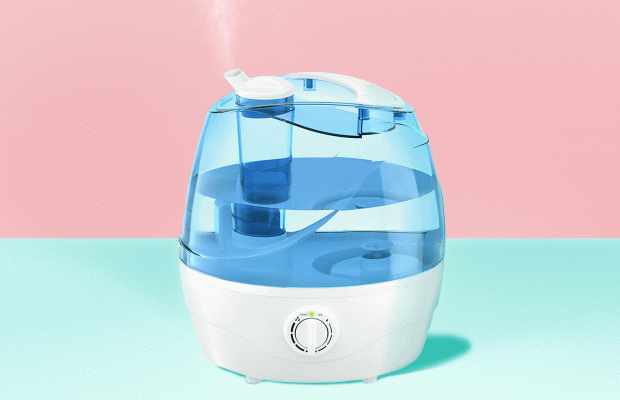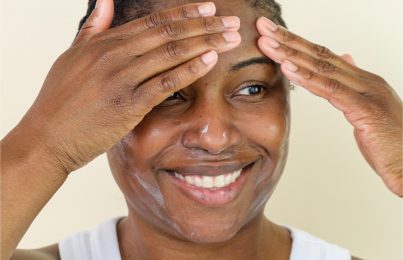Updated 12/5/23. If you live in a place where winter brings on freezing temperatures and snow, you know all too well the negative effect cold, dry air can have on your skin. In these conditions, even the most well-crafted skincare routine sometimes just doesn’t cut it.
In this case, my go-to recommendation is to use a humidifier in your bedroom. The great thing about using a humidifier is that it really addresses the source of your skin’s dehydration instead of leaving you playing catch-up. Keep reading to learn how to make the most of a humidifier and achieve hydrated, bouncy skin—along with a good moisturizer, of course.
Why Does Cold Air Dry Out the Skin?
To understand how a humidifier can benefit you, it helps to understand the problem it’s solving. Think of cold air as a moisture magnet. Cold air equals low humidity, and when humidity is low, the air will pull moisture from its surroundings. Unfortunately, that includes your skin.
Throughout the day, our skin naturally loses moisture through a process called transepidermal water loss (TEWL). This is when the outermost layer of our skin loses water to the surrounding air through evaporation. In dry environments, this process is accelerated. The water in your skin evaporates too quickly for your body to replace it, which leads to dehydration. This dehydration can disrupt your skin’s protective moisture barrier, which in turn can lead to even more dehydration. It’s a vicious cycle!
How a Humidifier Benefits the Skin
If you’re struggling with tight, dry, sensitive skin, here’s how a humidifier might help.
1. Keeps Skin Hydrated
By pumping moisture into the air, a humidifier can help break the (seemingly endless) cycle of skin dehydration and moisture barrier damage. Once the air has enough humidity, it will stop acting like a moisture magnet and stealing water from your skin. This will allow your barrier to repair itself, which will, in turn, make it easier for your skin to retain moisture.
Pro Tip: Start applying your skincare products immediately after washing your face or getting out of the shower. After wetting your face, you have a sixty-second window to get your toner or serum on before moisture evaporation starts to occur. To avoid this, perform your routine as quickly as possible to seal everything in. Get more tips for preventing and repairing barrier damage.
2. Makes Your Hydrating Products More Effective
If you use a water-based hydrating product like a toner or serum, having a humidifier around will make it more effective. Humectants (ingredients that bind water to the skin) are looking to attract water, and if they can’t find it in the air, they’ll start pulling it out of the deeper layers of your skin. Ironically, this can leave you more dehydrated than when you started. Common humectants include hyaluronic acid, sodium hyaluronate, and glycerin. I like to use this hydrating essence in the winter.
If you’re in a dry climate and are using humectant ingredients that provide water-based hydration, it’s important to use an occlusive product on top as your last step. An occlusive is something that creates a seal on the skin, like a moisturizer or oil. This seal keeps moisture in and prevents it from evaporating into the air but make sure you use a facial oil the correct way. Of course, you always want to use the right occlusive product for your skin type.
Read: Eight Tips to Cure Dry, Itchy Skin on the Body
3. Prevents Chapped Lips
Our lips are so delicate and don’t have sebaceous (oil) glands like the rest of our face. Not to mention the fact that they experience a lot of wear and tear throughout the day. This makes them especially prone to dehydration and chapping, which no one wants. Using a humidifier in your home will minimize moisture evaporation from this delicate area. Here are eight more tips for preventing chapped lips.
Other Benefits of a Humidifier
The benefits of a humidifier go far beyond well-hydrated skin! Here are a few bonuses.
4. Minimizes Flyaways and Frizz
More moisture in the air means less static electricity. This means no more clingy clothes, getting shocked, and, best of all, fewer flyaways and frizz!
5. May Slow Down the Spread of the Flu
A study showed that a virus is 32 percent less likely to survive when relative humidity is between 40 and 60 percent. A home in the winter can drop to a 15 percent humidity level, so using a humidifier can boost this significantly.
6. Prevents Dry Sinuses
If you experience sinusitis (as so many of us do in winter), a humidifier can offer much-needed comfort. More moisture in the air helps ease congestion and even prevent nosebleeds.
Final Notes on Using a Humidifier in Your Home
- There IS such a thing as too much humidity. The EPA suggests indoor humidity levels stay between 30 and 50 percent. Anything above 60 percent is too high and may facilitate mold growth.
- Be sure to keep your humidifier clean. If germs or mold start to build up, these could be dispersed into the air through the humidifier’s vapors. Always follow the manufacturer’s cleaning instructions and change filters regularly.
- Use purified water. Minerals from hard tap water can build up in a humidifier and not only damage the machine but be pushed into the air.
Celebrity Esthetician & Skincare Expert
As an esthetician trained in cosmetic chemistry, Renée Rouleau has spent 35 years researching skin, educating her audience, and building an award-winning line of products. Her hands-on experience as an esthetician and trusted skin care expert has created a real-world solution — products that are formulated for nine different types of skin so your face will get exactly what it needs to look and feel its best. Trusted by celebrities, editors, bloggers, and skincare obsessives around the globe, her vast real-world knowledge and constant research are why Marie Claire calls her “the most passionate skin practitioner we know.”



Comments:
Thanks for the email re: Benefits of Using a Humidifier in Winter-
Do you recommend a specific humidifier that you love ?
Kindly,
Gena
Posted By: gena robin |
Hey there! Any brand will do but make sure that the one you use is the right size to use in the room you have it in!
Posted By: Renée Rouleau |
Hi, I was wondering if you had any recommendations on humidifiers? Also, should they be hot or cold in the winter? Thanks!
Posted By: Erica |
I personally use a cold one but I think both hot and cold deliver the same benefit to the air, but you may want to ask the manufacturers what the difference is.
Posted By: Renée Rouleau |